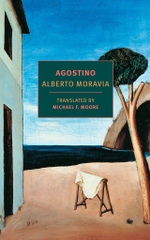An NYRB Classics Original
Thirteen-year-old Agostino is spending the summer at a Tuscan seaside resort with his beautiful widowed mother. When she takes up with a cocksure new companion, Agostino, feeling ignored and unloved, begins hanging around with a group of local young toughs. Though repelled by their squalor and brutality, and repeatedly humiliated for his weakness and ignorance when it comes to women and sex, the boy is increasingly, masochistically drawn to the gang and its rough games. He finds himself unable to make sense of his troubled feelings. Hoping to be full of manly calm, he is instead beset by guilty curiosity and an urgent desire to sever, at any cost, the thread of troubled sensuality that binds him to his mother.
Alberto Moravia’s classic, startling portrait of innocence lost was written in 1942 but rejected by Fascist censors and not published until 1944, when it became a best seller and secured the author the first literary prize of his career. Revived here in a new translation by Michael F. Moore, Agostino is poised to captivate a twenty-first-century audience.
...[P]sychologically brilliant...Only Moravia could have written such a nasty and perfect ‘beach read.’
—Harper’s Magazine
...this dreamy, haunting study of a young boy’s painful initiation into sexual consciousness is so psychologically rich and vividly imagined—in Moore’s plangent translation—that it resembles a painting as much as a novella...Like the best of NYRB Classics’ European repertoire, this book both rewards admirers of its illustrious author while providing an entry point for curious readers. Either way, the twinned landscapes of frustrated Oedipal longing and the Fascist-era coastline evoke a tainted beauty both sensuous and violent.
—Publishers Weekly starred review
Originally published in 1945, this novel about the loss of innocence shines in a new translation....Perceptive and razor-sharp insights into the agony of adolescence.
— Kirkus starred review
The carnality that animates Agostino is naked and unashamed. But the reader who stays to its end will see that it is love with dross burned clean away.
—William DuBois, The New York Times
Agostino is the case-study of an Oedipal conflict which manifests itself rather late by classical Freudian standards, but offers Moravia, in line with the whole tradition of the novel of adolescence in Europe, a richer, more complex subject matter to make use of than would otherwise be the case.
—The Southern Review
In the sober narrative of Agostino Moravia again dissected a mother-son relationship as the young protagonist of the novella made the joint discovery of sexuality (while his young, beautiful, sensuous mother became involved with a lover) and of class distinction, as the neglected boy took up with a band of working-class youth, whose sexual knowledge was far more advanced than his own. Their contempt for his innocence and their envy of his family’s wealth run through the story in a typically Moravian juxtaposition.
—William Weaver, The New York Review of Books
An expert study of an adolescent boy and the anguished processes by which he accepts the fact that his mother is, primarily, a woman.
—Vogue
Moravia writes with spare attention; the reader becomes enraptured in this sensual world just as Agostino himself begins to take notice of it.
—Nathaniel Popkin, Cleaver Magazine
Michael F. Moore has given us a wonderful new translation of a classic coming-of-age story set in the modern world. His translation is seamless and loyal to the original yet updated enough to appeal to contemporary readers.
—Andrew Martino, World Literature Today


